5 books about Black Muslims
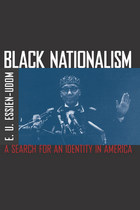
Black Nationalism
The Search for an Identity
E. U. Essien-Udom
University of Chicago Press, 1995
One of the first studies of the organization, life and meaning of the Nation of Islam and, by extension, all Black Nationalist movements, this classic work dispels the still common conception that the movement functioned primarily for political purposes. By observing the daily life of its members, Essien-Udom demonstrates that the Nation of Islam served primarily as a means for poor urban blacks to attain a national identity, a sense of ethnic consciousness, and empowerment in a society that denied them these privileges. Black Nationalism continues to hold profound implications for our understanding of the appeal of Black Nationalism as an ideology and a political force.
"An excellent standard treatment of black nationalist belief and practice in the 50's."—Michael Eric Dyson, New York Times Book Review
"This is an absorbing exercise in first class reporting. . . . In the light of his scrupulous fairness, the book is another illustration of how the press prejudges a story. And most provocatively, Essien-Udom has emphasized that even after the current campaigns for wide-scale integration are won, there will be an even wider chasm between the 'liberated' Negro middle class and the rootless Negro poor."—Nat Hentoff,Commonweal
"An excellent standard treatment of black nationalist belief and practice in the 50's."—Michael Eric Dyson, New York Times Book Review
"This is an absorbing exercise in first class reporting. . . . In the light of his scrupulous fairness, the book is another illustration of how the press prejudges a story. And most provocatively, Essien-Udom has emphasized that even after the current campaigns for wide-scale integration are won, there will be an even wider chasm between the 'liberated' Negro middle class and the rootless Negro poor."—Nat Hentoff,Commonweal
[more]
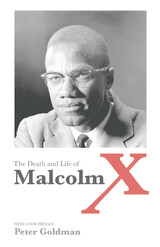
The Death and Life of Malcolm X
Peter Goldman
University of Illinois Press, 2013
The Death and Life of Malcolm X provides a dramatic portrait of one of the most important black leaders of the twentieth century. Focusing on Malcolm X's rise to prominence and the final year of his life, the book details his rift with the Nation of Islam and its leader, Elijah Muhammad, leading to death threats and eventually assassination at the hands of a death squad. In a new preface for this edition, Peter Goldman reflects on the forty years since the book's first publication and considers new information based on FBI surveillance that has since come to light.
[more]
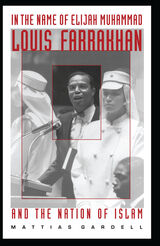
In the Name of Elijah Muhammad
Louis Farrakhan and The Nation of Islam
Mattias Gardell
Duke University Press, 1996
In the Name of Elijah Muhammad tells the story of the Nation of Islam—its rise in northern inner-city ghettos during the Great Depression through its decline following the death of Elijah Muhammad in 1975 to its rejuvenation under the leadership of Louis Farrakhan. Mattias Gardell sets this story within the context of African American social history, the legacy of black nationalism, and the long but hidden Islamic presence in North America. He presents with insight and balance a detailed view of one of the most controversial yet least explored organizations in the United States—and its current leader.
Beginning with Master Farad Muhammad, believed to be God in Person, Gardell examines the origins of the Nation. His research on the period of Elijah Muhammad’s long leadership draws on previously unreleased FBI files that reveal a clear picture of the bureau’s attempts to neutralize the Nation of Islam. In addition, they shed new light on the circumstances surrounding the murder of Malcolm X. With the main part of the book focused on the fortunes of the Nation after Elijah Muhammad’s death, Gardell then turns to the figure of Minister Farrakhan. From his emergence as the dominant voice of the radical black Islamic community to his leadership of the Million Man March, Farrakhan has often been portrayed as a demagogue, bigot, racist, and anti-Semite. Gardell balances the media’s view of the Nation and Farrakhan with the Nation’s own views and with the perspectives of the black community in which the organization actively works. His investigation, based on field research, taped lectures, and interviews, leads to the fullest account yet of the Nation of Islam’s ideology and theology, and its complicated relations with mainstream Islam, the black church, the Jewish community, extremist white nationalists, and the urban culture of black American youth, particularly the hip-hop movement and gangs.
Beginning with Master Farad Muhammad, believed to be God in Person, Gardell examines the origins of the Nation. His research on the period of Elijah Muhammad’s long leadership draws on previously unreleased FBI files that reveal a clear picture of the bureau’s attempts to neutralize the Nation of Islam. In addition, they shed new light on the circumstances surrounding the murder of Malcolm X. With the main part of the book focused on the fortunes of the Nation after Elijah Muhammad’s death, Gardell then turns to the figure of Minister Farrakhan. From his emergence as the dominant voice of the radical black Islamic community to his leadership of the Million Man March, Farrakhan has often been portrayed as a demagogue, bigot, racist, and anti-Semite. Gardell balances the media’s view of the Nation and Farrakhan with the Nation’s own views and with the perspectives of the black community in which the organization actively works. His investigation, based on field research, taped lectures, and interviews, leads to the fullest account yet of the Nation of Islam’s ideology and theology, and its complicated relations with mainstream Islam, the black church, the Jewish community, extremist white nationalists, and the urban culture of black American youth, particularly the hip-hop movement and gangs.
[more]
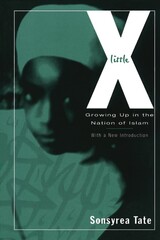
Little X
Growing Up In The Nation Of Islam
Sonsyrea Tate
University of Tennessee Press, 2004
"Instead of writing a bitter condemnation of the Nation of Islam, Tate has adroitly described its purpose as well as its shortcomings." —USA Today
"A temperate and sympathetic treatment of an African-American family's religious evolution." —Publishers Weekly
"A compelling story. It provides an honest, inside view of one of America's most controversial religious movements and perceptively points to social tensions of race, gender and religious identity." —Kirkus Reviews
"Extremely valuable. Recent literature is interested almost exclusively in male leaders. Tate's book provides a new perspective. I have used the book in a number of teaching contexts to very good results." —Judith Weisenfeld, Vassar College
In Little X, Sonsyrea Tate reveals, through the acute vision and engaging voice of a curious child, the practices and policies of the mysterious organization most know only through media portrayals of its controversial leaders Elijah Muhammad, Malcolm X, and Louis Farrakhan. First published in 1997, Little X chronicles the multigenerational experience of Tate's family, who broke from the traditional black church in the 1950s to join the radical Nation of Islam, then struggled to remain intact through disillusionment, shifting loyalties, and forays into Orthodox Islam.
Little X is also an absorbing story of a little girl whose strict Muslim education filled her with pride, confidence, and a longing for freedom, of a teenager in an ankle-length dress and headwrap struggling to fit in with non-Muslim peers, and of a young woman whose growing disillusionment with the Nation finally led to her break with the Muslim religion. Little X offers a rare glimpse into the everyday experience of the Nation of Islam, and into a little-understood part of America's history and heritage.
Sonsyrea Tate-Montgomery has been a staff writer for the Virginian Pilot, Chicago Tribune, and the Washington Post. The recipient of four coveted Echoes of Excellence awards from the National Association of Black Journalists, Tate has also worked as assistant to Congresswoman Eleanor Holmes Norton. She currently works as a political reporter for The Gazette, a Post-Newsweek publication.
"A temperate and sympathetic treatment of an African-American family's religious evolution." —Publishers Weekly
"A compelling story. It provides an honest, inside view of one of America's most controversial religious movements and perceptively points to social tensions of race, gender and religious identity." —Kirkus Reviews
"Extremely valuable. Recent literature is interested almost exclusively in male leaders. Tate's book provides a new perspective. I have used the book in a number of teaching contexts to very good results." —Judith Weisenfeld, Vassar College
In Little X, Sonsyrea Tate reveals, through the acute vision and engaging voice of a curious child, the practices and policies of the mysterious organization most know only through media portrayals of its controversial leaders Elijah Muhammad, Malcolm X, and Louis Farrakhan. First published in 1997, Little X chronicles the multigenerational experience of Tate's family, who broke from the traditional black church in the 1950s to join the radical Nation of Islam, then struggled to remain intact through disillusionment, shifting loyalties, and forays into Orthodox Islam.
Little X is also an absorbing story of a little girl whose strict Muslim education filled her with pride, confidence, and a longing for freedom, of a teenager in an ankle-length dress and headwrap struggling to fit in with non-Muslim peers, and of a young woman whose growing disillusionment with the Nation finally led to her break with the Muslim religion. Little X offers a rare glimpse into the everyday experience of the Nation of Islam, and into a little-understood part of America's history and heritage.
Sonsyrea Tate-Montgomery has been a staff writer for the Virginian Pilot, Chicago Tribune, and the Washington Post. The recipient of four coveted Echoes of Excellence awards from the National Association of Black Journalists, Tate has also worked as assistant to Congresswoman Eleanor Holmes Norton. She currently works as a political reporter for The Gazette, a Post-Newsweek publication.
[more]
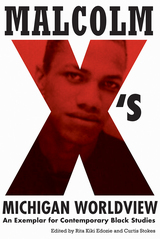
Malcolm X's Michigan Worldview
An Exemplar for Contemporary Black Studies
Rita Kiki Edozie
Michigan State University Press, 2024
The provocative debate about Malcolm X’s legacy that emerged after the publication of Manning Marable’s 2011 biography raised critical questions about the revolutionary Black Nationalist’s importance to American and world affairs: What was Malcolm’s association with the Nation of Islam? How should we interpret Malcolm’s discourses? Was Malcolm antifeminist? What is Malcolm’s legacy in contemporary public affairs? How do Malcolm’s early childhood experiences in Michigan shape and inform his worldview? Was Malcolm trending toward socialism during his final year? Malcolm X’s Michigan Worldview responds to these questions by presenting Malcolm’s subject as an iconography used to deepen understanding of African descendent peoples’ experiences through advanced research and disciplinary study. A Black studies reader that uses the biography of Malcolm X both to interrogate key aspects of the Black world experience and to contribute to the intellectual expansion of the discipline, the book presents Malcolm as a Black subject who represents, symbolizes, and associates meaning with the Black/Africana studies discipline. Through a range of multidisciplinary prisms and themes including discourse, race, culture, religion, gender, politics, and community, this rich volume elicits insights about the Malcolm iconography that contribute to the continuous formulation, deepening, and strengthening of the Black studies discipline.
[more]
READERS
Browse our collection.
PUBLISHERS
See BiblioVault's publisher services.
STUDENT SERVICES
Files for college accessibility offices.
UChicago Accessibility Resources
home | accessibility | search | about | contact us
BiblioVault ® 2001 - 2024
The University of Chicago Press









